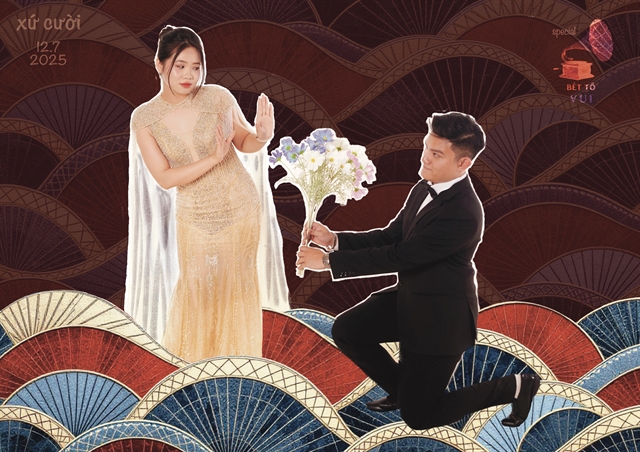 Life & Style
Life & Style

 |
| Musicologist and producer Mai Đức Hạnh. Photos courtesy of Bét Tô VUI |
Operetta The Land of Smiles will be presented in full next month at the Việt Nam National Academy of Music (VNAM). The work is produced by a group of young artists who performed a few excerpts from the piece in February.
Việt Nam News reporter Nguyễn Bình chats with producer and musicologist Mai Đức Hạnh about her first time working on an operetta production.
How did you get into the operetta?
Quite coincidentally — I wasn’t actively seeking it.
At the end of last year, a young foreign conducting student proposed the idea of staging this operetta. He planned to invite a small orchestra to accompany him for practice. He reached out to musician Phúc Phan and a group of singers, and asked me to handle the organisational aspects. However, due to limited financial capacity, he had to withdraw.
I felt it would be a shame to waste the efforts of the entire team, who had been practising for a whole year — both musically and linguistically, in German. One of the singers even flew from HCM City several times to practise. So, I decided to take charge of organising the performance.
Personally, I’m grateful to that conducting student for bringing this operetta into my life.
When I heard the singers perform the work live, I found it incredibly pleasant. I could hum along and thoroughly enjoyed it. The operetta tells a bittersweet love story that bridges eastern and western cultures, which resonates with many real-life stories I’ve witnessed and experienced myself, making the piece even more compelling.
In general, entering an opera/operetta is like stepping into an enchanting world that is rich in emotional nuance. Producing an operetta also allows me to experience the artistic process from a holistic perspective, after previously participating in smaller roles in past productions with other organisations.
What difficulties have you encountered during the operetta's production?
Should I be hesitant to say that the biggest challenge was financial? But it’s the reality.
I don’t know if music conservatories or cultural management programmes around the world offer courses on how to produce an opera or operetta, but here in Việt Nam, I haven’t come across any. So, I had to rely on my years of experience organising concerts for symphony orchestras and theatres, along with my academic background in musicology, to create a framework for the performance myself.
I also worry a lot about various facets of the operetta, from the staging and costumes to the artists. Plus, I wonder how the subtitles should be translated to remain faithful to the original, while still being accessible to Vietnamese audiences. Subtitles are my area.
Meanwhile, the music is overseen by composer Phúc Phan, and the natural acoustics in the small VNAM concert hall support unamplified vocal performances well. Those are the aspects I’m confident in.
However, what I envisioned in terms of set design and lighting was far beyond what our budget could support — so there’s a big gap between the ideal and the reality.
Can you describe your vision for this production of The Land of Smiles?
In Việt Nam, opera has made some progress and has been somewhat welcomed by audiences, but I think its potential to reach wider audiences is now showing more promising signs.
The average age of musical theatre-goers is getting younger, and I believe audiences should have opportunities to enjoy a wider range of operettas beyond the classical operas that are often repeated.
The Land of Smiles was created in a transitional period, the early 20th century, when western audiences began to move away from grand, lengthy operas and sought something simpler and more relatable. It combines humour and tragedy in compact stories, while still making use of expressive, technically demanding singing.
This genre helped lay the foundation for the cinematic arts. The Land of Smiles was adapted into several film versions, with the composer himself even appearing as an actor.
I believe these characteristics align well with the tastes of modern Vietnamese audiences.
I hope people will come to see The Land of Smiles, feel something from it, and support us in carrying out more projects in the future.
 |
| 'The Land of Smiles' will take the stage at the Việt Nam National Academy of Music on July 22. |
What has the creative process for The Land of Smiles been like?
It all began with the music, of course. Composer Phan Huy Phúc, who trained in the US, is thoroughly proficient in opera and operetta. He selected the cast and coached them through character exploration and each musical piece.
He guided them in breath control, phrasing, emphasising the right words for expression, and, most importantly, taught them proper German pronunciation. The singers also helped develop movements and stage directions for each scene.
While solo arias are a hallmark of musical theatre, our group, Bét Tô VUI, places even greater value on ensemble pieces and interaction, avoiding the excessive glorification of any single performer.
Our core value is to honour the true artistic merit of the work.
What would you advise people getting into opera and operetta for the first time?
Start with the music — it's always for the sake of music. Train rigorously, master the genre, choose roles that suit you, study the script in depth, learn the language. Let go of your ego when you commit seriously to music, especially in the beginning.
Never think you know everything — and always question what you think you know. For the audience, just open your heart and listen. - VNS




